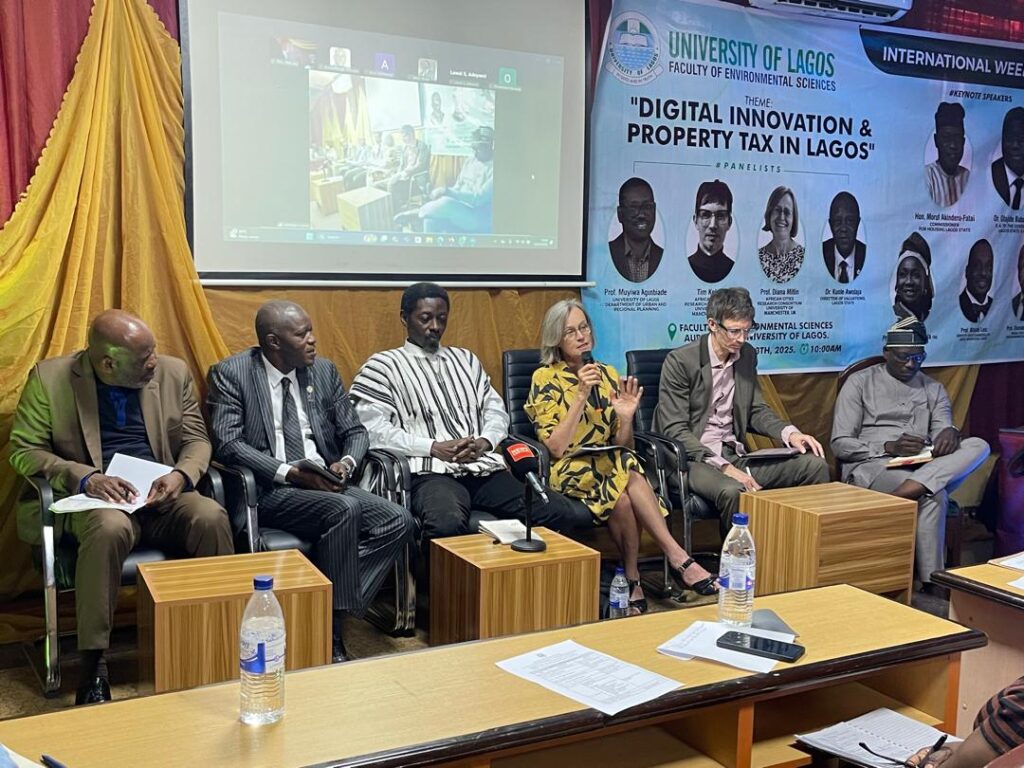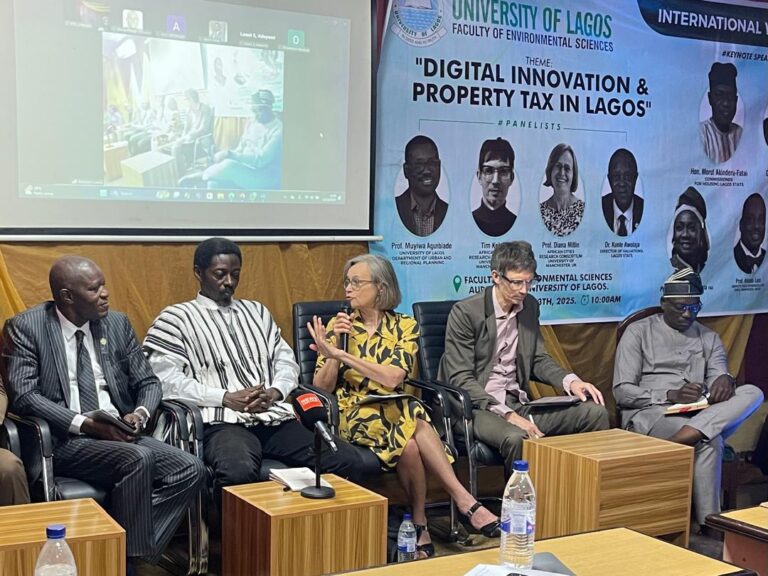On Monday, 13 October, professionals, including university eggheads, tax consultants, quantity surveyors, urban planners, property valuers, and researchers, shared their thoughts on the challenges of housing, population growth, tax remittances, and demolitions in Lagos, Southwest Nigeria.
To these stakeholders, when a government is accountable, responsible, and responsive to the yearnings and aspirations of citizens, paying relevant taxes by these citizens may not be difficult.
The event was a workshop organised by the Faculty of Environmental Sciences, University of Lagos, featuring the African Cities Research Consortium (ACRC), an organisation focused on improving urban policy and practice in select African cities.
Themed: “Digital Innovations and Property Tax in Lagos,” it was part of the activities to mark UNILAG’s 2025 edition of the annual International Week, with the Lagos State Government, Alphabeta Consulting Limited Liability Partnership, among other stakeholders, in attendance.
In his welcome address, the Dean of the Faculty of Environmental Sciences, Olumide Adenuga, a professor, highlighted the importance of property taxation to national development, urging governments at all levels to remain accountable to the citizens to encourage compliance.
Keynote
In his keynote presentation, Muyiwa Agunbiade, a professor of Urban and Regional Planning at the university, revealed that about 70 per cent of properties in Lagos are not captured in the government’s registry, adding that poor infrastructure contributes significantly to the state’s failure to properly capture these properties.
Mr Agunbiade said beyond the deployment of artificial intelligence is the challenge of infrastructure, noting that Nigerians always want to join the global craze for innovations without addressing the basic issues of infrastructure.
He said, in Lagos, land development and administration have so much to contribute to the effectiveness of property tax, noting that the existing system, though regulated by planning laws, suffers from the challenge of outdated data, which he noted, has also given room for informal growth.
The don, who hinted that in Lagos, and indeed, the whole of Nigeria, there is no functional cadastral mapping, noted that many mistake base mappings for cadastral mappings.
He said without functional cadastral mappings, it will be difficult to properly capture and register landed properties.
He said with a cadastral mapping, scanning a property document will show a location that is properly georeferenced, and show the attributes of the specific property.
“So, we have a resemblance of the cadastral map in Abuja. Lagos has also been on this thing for quite some time now, especially during the administration of former Governor Babatunde Fashola. But because it is a very tricky and risky thing to do, because you really need to have the areas mapped out, you have to know the boundaries, describe the size, the use, and ownership before you claim you have a complete cadastral map, nothing much has been done,” he said.
The expert said, regardless of the importance of Artificial Intelligence, infrastructure is key. He urged concerned authorities to provide adequate infrastructure before joining the world to “jump on” AI as a tool.
He said, though innovations such as remote sensing and smart zoning, could help to address the challenge of mapping, poor infrastructure would definitely constitute a significant factor to their control.
He said: “In Nigeria, sometimes ago, we were talking about Sustainable Development, and then jumped to smart city, and from smart city, we are discussing AI. All these things are mere words; what will drive them is infrastructure which we don’t have. What we have is either not appropriate or inadequate.”
Mr Agunbiade, therefore, recommended what he simply described as a “citizen-centred, tech-driven property tax system” that will combine accountability with innovation in a fair and just atmosphere.
This submission received wide applause, commendation, and endorsement from other panellists and the audience.
ACRC representatives
Led by its Chief Executive Officer (CEO), Diana Mitlin, a professor, the African Cities Research Consortium’s (ACRC’s) team also included a Co-Research Fellow, Tim Kelsall, and the ACRC Accra City Manager in Ghana, Farouk Braimah, who participated as panellists.
Mrs Mitlin, who described property tax as a source of revenue for the government, noted that such revenues are expected to be used to provide infrastructure for the people.
READ ALSO: Zambia’s success in school feeding reminds Nigeria of dream deferred
She said if a government prioritise judicious use of tax collected people will be encouraged to fulfill their obligations by paying taxes regularly.
Mrs Mitlin said UNILAG should be commended for its commitment to take forward planning and development in the city of Lagos.
She said: “We have heard today that there have been a lot of challenges with tax compliance, and specifically, property tax is not easy. I think one of the best ways is our commitment to using new forms of technology, the digital innovations. I think that is clearly important. But I also think what people have shared here is getting the relationships right. I think the state government can support the revenue generation drive by developing the right tools and also having a dialogue about what is possible on how everyone can contribute most effectively.”
On his part, Mr Brahimah, who shared his perspectives from the experiences in Ghana, said the circumstances may be different, but concluded that accountability on the part of the government fuels commitment of the citizens to pay taxes.
Other participants
The Director of Finance and Accounts at the Lagos State Ministry of Housing, Adefunke Adewale, who represented the ministry’s Commissioner, Moruf Akinderu-Fatai, expressed the state’s commitment to ensuring the availability of affordable housing for Lagos residents.

The commissioner, however, lamented the growing population and the accompanying challenges, noting that the state is committed to deploying technology to address some of these challenges.
This is as the commissioner agreed that in many developing states like Lagos, “manual systems, incomplete records, and limited coverage hamper property taxation”.
He said the state is currently piloting digital house numbering and addressing system so as to assign every property in Lagos a unique digital identity.
He said; “Digital innovation in property tax is not merely about boosting revenue; it is about equity, transparency, and governance.”
Also on the panel were the Director of the Lagos State Valuation Office, Kunle Awolaja, and the Representative of Aphabeta Consulting Limited Liability Partnership, Abayomi Yusuf, who explained the challenges posed by the attitudes of many residents not to follow due process in land allocation, registration, and development.

